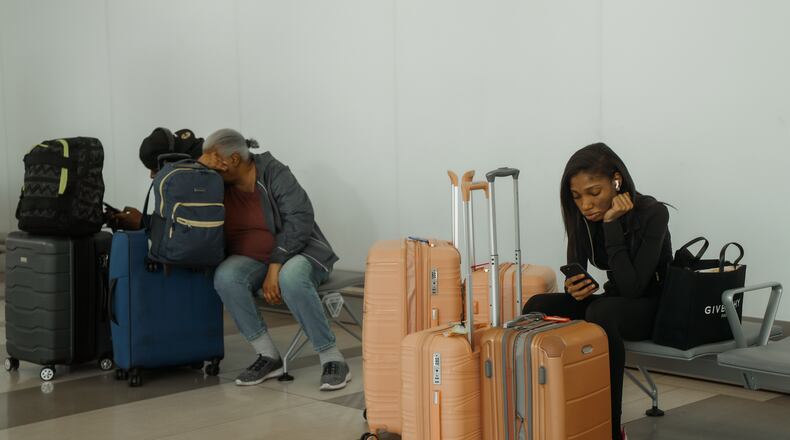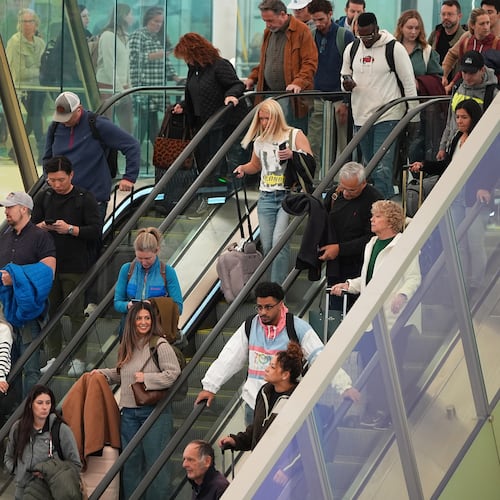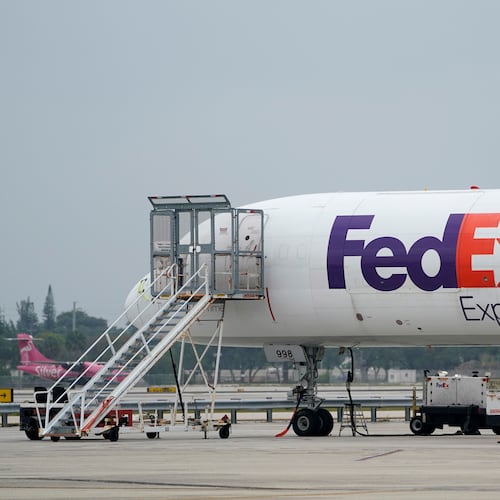U.S. airlines canceled more than 2,500 weekend flights by Saturday evening as the Federal Aviation Administration’s mandate to reduce air traffic because of the government shutdown showed no signs of easing.
The slowdown at many of the nation’s busiest airports did not cause immediate widespread disruptions. But it deepened the impact felt by the nation’s longest federal shutdown.
“We all travel. We all have somewhere to be,” said Emmy Holguin, 36, who was flying from Miami to see family in the Dominican Republic. “I'm hoping that the government can take care of this.”
Analysts warn that the upheaval will intensify and spread far beyond air travel if cancellations keep growing and reach into Thanksgiving week.
Already there are concerns about the squeeze on tourism destinations and holiday shipping.
Here’s what to know about the flight reductions:
How many flights have been canceled?
Cancellations jumped Saturday — typically a slow travel day — to more than 1,500, following just over 1,000 the previous day, according to the tracking website FlightAware. By the evening U.S. airlines already had canceled another 1,000-plus for Sunday.
Airports in Atlanta and Chicago, as well as Charlotte, North Carolina, and Newark, New Jersey, saw numerous disruptions throughout the day. Ongoing staffing shortages in radar centers and control towers added to the cancellations and delays at several East Coast airports, including those around New York City.
Not all the cancellations were due to the FAA order, and those numbers represented just a small portion of the overall flights nationwide. But they are certain to rise in the coming days if the slowdown continues.
The FAA said the reductions impacting all commercial airlines started at 4% of flights at 40 targeted airports and will be bumped up again Tuesday before hitting 10% on Friday.
Transportation Secretary Sean Duffy warned this week that even more cuts might be needed if the shutdown continues and more air traffic controllers are off the job.
Why are the flights being canceled?
Controllers have gone without paychecks for nearly a month during the shutdown, leading many to call in sick and compound previously existing staffing shortages.
Most are working mandatory overtime six days a week during without pay, and some are taking second jobs to pay their bills, the National Air Traffic Controllers Association has said.
On Saturday the union said it had delivered 1,600 handwritten letters from members to Congress calling for the shutdown to end.
How are passengers being affected?
Most were relieved to find that airlines largely stayed on schedule Friday, and those whose flights were called off were able to quickly rebook. So far, longer international flights have not been interrupted.
There is still a lot of uncertainty about which flights will be canceled next.
And not everyone has the means to pay for a hotel or deal with a last-minute disruption, said Heather Xu, 46, who was in Miami on Saturday after a cruise and flying home to Puerto Rico.
“Travel is stressful enough. Then you put these disruptions in place, and it really makes everything more challenging,” she said.
Rental car companies reported a sharp increase in one-way reservations Friday, and some people simply canceled flights altogether.
Diana Alvear of Bridgewater, New Jersey, scratched her family’s trip next weekend to see in-laws in California because of concerns about flying when controllers are working long hours and understaffed.
She also was nervous about being stranded, which would be “a huge debacle” for work. United Airlines gave her credit for the airfare, but the family is still out nearly $700 for the deposit on an Airbnb.
“This has been costly to us, and it’s a huge disappointment for us and our family,” Alvear said. “It’s really weighing on our hearts that we had to do this.”
What could be the impacts beyond air travel?
First there is the potential for higher prices in stores, as nearly half of U.S. air freight is shipped in the bellies of passenger aircraft.
Major flight disruptions could bring higher shipping costs that get passed on to consumers, said Patrick Penfield, professor of supply chain practice at Syracuse University.
Further losses will ripple through the economy if the slowdown continues, from tourism to manufacturing, said Greg Raiff, CEO of Elevate Aviation Group.
“This shutdown is going to impact everything from cargo aircraft to people getting to business meetings to tourists being able to travel,” Raiff said. “It’s going to hit the hotel taxes and city taxes. There’s a cascading effect that results from this thing.”
___
Associated Press journalists Cody Jackson in Miami, Paul Wiseman in Washington, Josh Funk in Omaha, Nebraska, and Anne D’Innocenzio in New York contributed.
Keep Reading
The Latest
Featured


